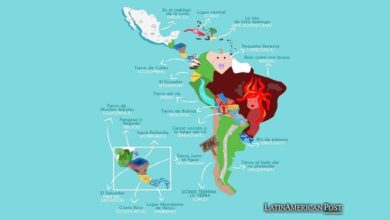Elections in Spain: Is it Time for Independence?
In the last Spanish elections, pro-independence regional parties will have the power to unbalance political deadlock.

Photo: Arne Müseler
LatinAmerican Post | Santiago Gómez Hernández
Listen to this article
Leer en español: Elecciones en España: ¿Es el momento del independentismo?
On July 23rd, Spaniards were called for early elections by President Pedro Sanchez. The leader of the Socialist Party made this decision after the electoral setback in the regional elections, in which the PP strengthened, and many estimated an apparent defeat of Sanchez in the upcoming ballots. This move has paid off.
You can also read: Spain: The Right-Wing Wins but Without Majorities. Will there be New Elections?
Despite what was expected by the polls, the results of the Popular Party were less favorable than expected. This was mainly due to the final performance of the PSOE, which achieved a better result.
Catalan Parties
After the four big parties, PP, PSOE, VOX, and Sumar, two parties could unbalance the balance: Junts per Catalunya and Esquerra Republicana Catalunya, both with seven seats in the Congress. Although both lost seats in Congress (1 and 6, respectively), they remain relevant. With only one that decides to join the right-wing coalition (unlikely), they could give the presidency to Alberto Núñez Feijóo immediately. For his part, Pedro Sánchez will have to count on the support of both if he wants to avoid a second call for elections. Even, depending on enough abstentions, it could come in a second vote.
Both movements are pro-independence leaning, so much so that the former leader of Junst, Carles Puigdemont, was the one who called the independence referendum that Madrid considered illegal. Therefore, the Catalan politician now lives in exile.
Both movements fight for and have the ultimate ideal of peaceful independence from the central power in Madrid. Both Junts and ERC seek the confirmation of an independent and republican Catalunya. In the second vote of 2019, Junts voted against the inauguration of Pedro Sánchez, while ERC abstained to facilitate a simple majority for the leader of the PSOE. For this year, Sánchez will have to count on more significant support.
Both parties are expected to negotiate en bloc with Sánchez for a possible investiture. Their leaders hinted that they would be more demanding and seek several achievements.
Vascos Parties
After the Catalan parties, the Basque movements also gained the necessary support. EH Bildu. Of Mertxe Aizpura and the Basque Nationalist Party can equally determine the electoral result in the Congress. EH Bildu obtained six deputies (1 more than in the last elections), and the PNV reached 5 (1 less than four years ago). This means that together they can give the victory to Feijóo, or that, at least EH Bildu is necessary for Sánchez to be re-elected (and with enough abstentions).
In 2019, the PNV voted in favor of Pedro Sánchez, while EH Bildu abstained. Both votes were essential for the PSOE to form a government.
Minority Parties
Also in Congress were groups such as the Canary Coalition (1 deputy), the Union of the People of Navarre (1), and the Galician Nationalist Bloc (1). They do not represent a significant difference for a right-wing candidacy, but they will be vital for Pedro Sánchez.
Coalición Canaria is not a party with a pro-independence ideology compared to the Catalan or Basque movements, but it fights for greater autonomy in the Canary Islands. For its part, the BNG does seek independence for the Galician region in Spain, but under leftist parameters, which brings it closer to the PSOE. At the same time, the UPN is closer to the PP and conservative positions.
In 2019, the UPN and Coalición Canaria voted against Sánchez, while the Bloque Nacionalista Galego voted favorably.
An Uncertain Outcome
Although for both the PSOE and the PP to give in to a separatist consultation or referendum in Catalonia, the Basque Country, or any other autonomous community would be counterproductive, today, these parties have the necessary strength to reach favorable agreements whether they seek a larger budget for the autonomous governments, or greater autonomy, or even participation in the Government. Even possible pardons for political leaders (such as Puigdemont) could be possible points for these elections.
However, giving in too much could mean losing support in the rest of Spain. It would mean compromising future elections to win the most immediate ones. The pro-independence parties do not have much to lose and will be able to set red lines and block the election of the President of the Government and force another vote. Nevertheless, if this were to happen, they could lose seats in Congress when the helpful vote could increase.





